Meet Later-in-Life Mother Barbara Hannah Grufferman: Interview by Robin Gorman Newman, founder, MotherhoodLater.com
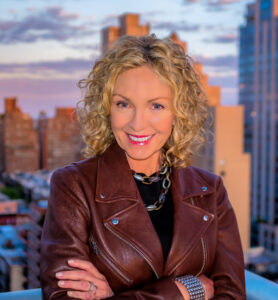 AGE: 63
AGE: 63
RELATIONSHIP STATUS: Married (27 years!)
RESIDENCE: New York City
AGES OF DAUGHTERS: Sarah (26) and Elizabeth (22)
I am the author of two award-winning books focusing on healthy aging, give talks on how to age better, founded Menopause Cheat Sheet, a newsletter devoted to exploring how menopause changes everything (in partnership with a leading endocrinologist), have appeared on every morning television show, serve as a trustee of the National Osteoporosis Foundation and Ambassador for HealthyWomen.org, and run marathons . . . all since turning 50. Before that I was the president of an international conference firm, held senior executive positions at several publishing companies, and started a magazine geared to teenage girls. I’m just warming up . . . https://www.barbarahannahgrufferman.com
Do you think it is challenging to balance parenting, a personal life and professional pursuits? Creating a life well lived that includes a fulfilling career (often with travel), community involvement, friendships, and marriage is daunting for anyone, but when you add parenting into the mix . . . holy moly. As Betty Davis once said, “Fasten your seat belts. it’s going to be a bumpy ride.” Yes, it’s an absolute challenge even for women who don’t pursue work outside the home, but as so many people have observed, “Parenting is the best job you’ll ever have.” And as I’ve witnessed time and time again, women are uniquely qualified to take on just about any challenge that’s handed to us. The more we are asked to do, the more we step up to the plate. Which leads us to your next question, which is critical.
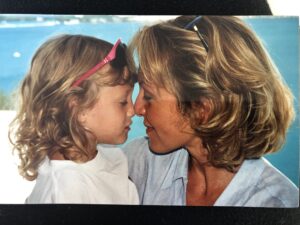 Did you have a strategy that worked when your daughters were young? Everyone must have a strategy to accomplish anything successfully. I don’t believe in luck, but I do believe in planning. And help. I’m a huge believer in asking for and getting as much help as possible, which is one of the reasons I love Hilary Clinton’s ubiquitous line: “It takes a village.”
Did you have a strategy that worked when your daughters were young? Everyone must have a strategy to accomplish anything successfully. I don’t believe in luck, but I do believe in planning. And help. I’m a huge believer in asking for and getting as much help as possible, which is one of the reasons I love Hilary Clinton’s ubiquitous line: “It takes a village.”
My oldest daughter, now 26, was born one year to the day of our wedding anniversary. We were shocked, and not quite ready for her arrival. I hadn’t even started wearing maternity clothe,s and her room certainly wasn’t ready! At the time, I was the publisher of the National Enquirer and Star magazines and leading an incredibly busy life. Sarah was born three months early, weighed 2 lbs. 2 ozs. and looked like a little bird. There were no warning signs, and my doctor was as shocked as we were. She stayed in the NICU of the hospital for almost three months. I only went home to sleep.
This experience shifted my priorities, as you can imagine. BS (before Sarah), my focus was building my career, but then I found myself thrust into motherhood at the age of 38 and I loved it more than I could have ever imagined. I so appreciated ‘Baby Boom’, the Diane Keaton movie from the ’80s where she is a laser-focused business executive who is suddenly put into a similar situation when a distant cousin passes away and leaves her . . . his baby daughter. I got it. So I had Sarah, kept working in my career, and started planning for another baby, who came along 2 and 1/2 years later.
Back to strategy: I let my bosses and staff know that I was now a mother, and everyone was to respect my boundaries. For sure, I delivered my best at work, but the days of working hours way beyond the call of duty were behind me. I also hired an incredible babysitter who stayed with my children while I worked as soon as Sarah came home from the hospital. Not only did she take care of Sarah, then Elizabeth (now 22), she also took great care of my husband, Howard, and me. Loving, caring, nurturing, and a wonderful cook, there is absolutely no doubt in my mind that I would never have been able to achieve the career successes I did, travel for business, and stay sane, without Julieth. Twenty-six years later, Julieth is still with us and will always be a part of our family. If incorporating hired help into the team is not possible for a woman to do, I implore them to seek help from family members and of course, insist that parenting is a joint effort (hello, fathers!), and not just on their shoulders. One thing that I simply did not have time to do was exercise or sleep enough, and I believe that these are two areas that continue to be woefully lacking in the lives of mothers. But, as you’ll see when I answer the next question, I made up for lost time when I hit 50.
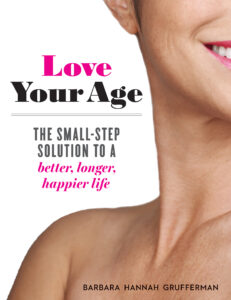 What was your inspiration to write books on the subject of aging, etc.? Like so many women, I was not being kind to myself — working very hard, traveling too much, trying not to let anything fall through the cracks, being an attentive and loving wife, daughter, sister, mother, friend, boss, coworker, employee — in other words, I was trying to do it all, have it all, and be everything to everyone who needed me. Sound familiar? My daughters were thriving, my marriage was stable, and everyone was happy, but I definitely was losing steam by the time I hit 49, at which point my daughters were 11 and 8. Having just gone through menopause, I was feeling what I call the ‘umpies’ — grumpy, frumpy, and a bit lumpy. All those years of putting everyone first was taking a toll. Postmenopausal weight was starting to rear its ugly head, I fell and broke my arm, only to learn that I had lost bone density due to menopause, and I was tired all the time. “Was this the reality of being 50?” After a long talk with myself and then with my husband, I decided to slow down on work and gave six months’ notice. After that I took on consulting gigs with my old firm and a few other companies, pared back on business travel, and decided to write my first healthy aging book — The Best of Everything After 50: The Experts’ Guide to Style, Sex, Healthy, Money and More — to help other women age better by taking control of their health and lives. I interviewed top experts in many different fields, followed their programs and advice, and then wrote about it in the book. It became a guide for myself and other women.
What was your inspiration to write books on the subject of aging, etc.? Like so many women, I was not being kind to myself — working very hard, traveling too much, trying not to let anything fall through the cracks, being an attentive and loving wife, daughter, sister, mother, friend, boss, coworker, employee — in other words, I was trying to do it all, have it all, and be everything to everyone who needed me. Sound familiar? My daughters were thriving, my marriage was stable, and everyone was happy, but I definitely was losing steam by the time I hit 49, at which point my daughters were 11 and 8. Having just gone through menopause, I was feeling what I call the ‘umpies’ — grumpy, frumpy, and a bit lumpy. All those years of putting everyone first was taking a toll. Postmenopausal weight was starting to rear its ugly head, I fell and broke my arm, only to learn that I had lost bone density due to menopause, and I was tired all the time. “Was this the reality of being 50?” After a long talk with myself and then with my husband, I decided to slow down on work and gave six months’ notice. After that I took on consulting gigs with my old firm and a few other companies, pared back on business travel, and decided to write my first healthy aging book — The Best of Everything After 50: The Experts’ Guide to Style, Sex, Healthy, Money and More — to help other women age better by taking control of their health and lives. I interviewed top experts in many different fields, followed their programs and advice, and then wrote about it in the book. It became a guide for myself and other women.
I had the great fortune to launch my first book on the Today Show with Ann Curry, and that kickstarted my writing, speaking and consulting career in the positive aging space. Part of my own personal program included carving out “me time” every day to either run, which I only started doing after I turned 50, strength-training, meditate, or just sit back and do absolutely nothing. Running became the foundation of my new life and led me to embrace many new healthy habits. I’m currently training for my 10th Marathon (virtual this year!). As a contributor to AARP, they asked me to write a book — Love Your Age: The Small Step Solution to a Better, Longer, Happier Life — which was co-published with National Geographic in 2018. I’m currently working on my third book. A few months ago, during the middle of the pandemic, one of my closest friends, a leading NYU Endocrinologist, and I started a weekly newsletter geared to exploring how menopause changes women’s lives in ways they never realized. We’re planning to do a podcast and other social media events focusing on menopause.
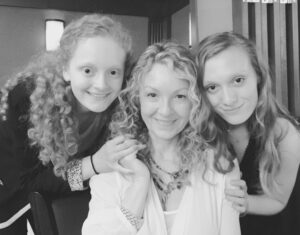 What do you see as the positives and challenges of having a child at age 35 or over? Being an older mother, I feel I had the time to devote to myself and my career prior to starting a family. I even feel this way about being an “older bride” — my husband and I got married when I was 37. Up until that point, I had the freedom to do what I wanted, explore relationships, travel the world, take risks (like learning how to fly an airplane), and really put the majority of my energy and time on my career. While getting married curtailed some of that, it still allowed me to forge ahead with my career ambitions, especially because I had the good sense to marry a “mensch” (a nice Jewish boy from Long Island) who applauded and supported me. But becoming a mother changed my worldview almost overnight. No longer would I even consider doing something as daring as skydiving or flying an airplane. My focus on financial planning was more serious, and discussions turned more towards life insurance and other tools to ensure that our daughters would be okay (well, financially anyway) if something ever happened to us.
What do you see as the positives and challenges of having a child at age 35 or over? Being an older mother, I feel I had the time to devote to myself and my career prior to starting a family. I even feel this way about being an “older bride” — my husband and I got married when I was 37. Up until that point, I had the freedom to do what I wanted, explore relationships, travel the world, take risks (like learning how to fly an airplane), and really put the majority of my energy and time on my career. While getting married curtailed some of that, it still allowed me to forge ahead with my career ambitions, especially because I had the good sense to marry a “mensch” (a nice Jewish boy from Long Island) who applauded and supported me. But becoming a mother changed my worldview almost overnight. No longer would I even consider doing something as daring as skydiving or flying an airplane. My focus on financial planning was more serious, and discussions turned more towards life insurance and other tools to ensure that our daughters would be okay (well, financially anyway) if something ever happened to us.
Because Sarah’s beginnings were fraught with uncertainties (there were weeks when we weren’t sure if she was going to make it, and then when she did, we wondered for years if she would experience some of the more common results of prematurity: issues with cognitive functioning, learning, eyesight, and so much more.) We were lucky, but it still made me keenly aware that I was responsible for another human being, and then another one after that, for many years to come. Staying alive and healthy and fit became my goal so I could be there for them as long as possible. So, just having these two beautiful beings in my life made me better. That’s a real benefit.
With regards to challenges, I truly don’t think there are any. Sure, sometimes I say ‘oy, I’m too old for this.” But, honestly, I’m not. Do I sometimes think perhaps I won’t be around to see grandchildren? Yes. But, it’s more important that my daughters fulfill their dreams before they settle down and start families anyway.
What did you most want to teach your children when you become a mom? There are several key things I wanted to make sure my daughters embraced: 1) always be financially self-reliant; 2) go as far as possible with your education; 3) never be afraid to ask for more 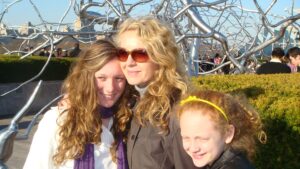 money or responsibility or the senior position; 4) always be kind and respectful, always; 5) make sleep, exercise, eating well and your overall health and well-being a top priority now, so you are well-prepared for anything in the future; 6) greet people by looking them in the eye when you see them; 7) try running (one of them took me up on it).
money or responsibility or the senior position; 4) always be kind and respectful, always; 5) make sleep, exercise, eating well and your overall health and well-being a top priority now, so you are well-prepared for anything in the future; 6) greet people by looking them in the eye when you see them; 7) try running (one of them took me up on it).
Were you conscious of raising them to be a Mensch (decent, responsible person)? There’s no question that both my daughters are Mensches. They are decent, kind, good people, and I believe they learned that from both my husband (definitely a Mensch) and me. It was a joint effort, but I’ll give my husband a little extra credit in this regard. At this writing, Sarah is finishing college online, working more than full time for a small but growing tech firm in the travel sector in South Carolina, and is in a committed relationship. Elizabeth just flew to Scotland where she’s attending graduate school at the University of Edinburgh for the next year. Both girls value family, commitment, responsibility, and kindness as much as my husband and I do, and for that, we are very proud.
Do you have any particular memories from your own childhood that inspired you to make memories with your daughters? My mother, who was from Brooklyn, NY, married my father, a U.S. Army soldier from a small town in Georgia, when she was 18, just around the time she had my older sister. Two years later, they were living in Carrollton, GA, and I was born. At age 22, my mother and father, with my sister and me in tow, moved back to working class Brooklyn to live with my maternal grandparents in their tiny attached house. Unable to find work, my father left one day for Georgia to visit his mother, and never returned. My mother was a single mother, newly divorced, working as a secretary in Manhattan. Every day I would wait at the bus stop to meet her. She taught me many things, but one of the most important was this: always be self-sufficient. Never put yourself in the position of having to depend on anyone. That way your relationships will be based on mutual want, not need. We lived with my grandparents in Brooklyn until I was 12 years old, at which time my mother married a professor of quantitative analysis from China and we all moved to Queens, NY (grandparents, too). But that’s a whole ‘nother story for another day.
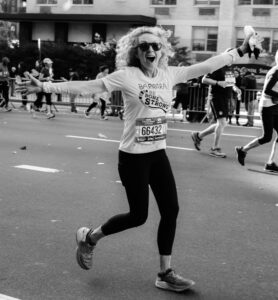 How do you practice good self care and role model for your daughters? The NYC Marathon goes right past our apartment building in NYC. In fact, it’s exactly the 17 1/2 mile mark. Howard and I moved into that building in 1997, a few months before Elizabeth was born. Every year we would stand outside and watch the runners go by, cheering, applauding and being totally amazed at their stamina. Years later, when Elizabeth was around 9, just when I was going through all of this post-menopause questioning, we were standing on the same corner watching the runners. But this year we were all holding up signs that said, “Go, Ms. Panata, Go!” One of Elizabeth’s teachers was running the marathon. As we waited, and watched the runners — all ages, shapes, and abilities — I wondered how anyone could actually run 26.2 miles. All of a sudden, Elizabeth turned to me and said, “I want to hold a sign that says “Go, Mom, Go!”. Everyone turned to me with amusement as I looked at her and said . . . “OK, I’ll do it.” That started my running, and marathon obsession. As a result, both daughters have seen the time and effort I put into exercise and keeping my body fit and strong. They’ve seen the transformation. One of them (Elizabeth) is now also a runner — she ran cross-country for her university and will be on the cross-country team for the University of Edinburgh, as well. Sarah deplores running but keeps herself fit in other ways. They saw what self-care did for their mother as she was turning 50, and they are doing everything possible to keep themselves fit, healthy and strong now . . . and in the future.
How do you practice good self care and role model for your daughters? The NYC Marathon goes right past our apartment building in NYC. In fact, it’s exactly the 17 1/2 mile mark. Howard and I moved into that building in 1997, a few months before Elizabeth was born. Every year we would stand outside and watch the runners go by, cheering, applauding and being totally amazed at their stamina. Years later, when Elizabeth was around 9, just when I was going through all of this post-menopause questioning, we were standing on the same corner watching the runners. But this year we were all holding up signs that said, “Go, Ms. Panata, Go!” One of Elizabeth’s teachers was running the marathon. As we waited, and watched the runners — all ages, shapes, and abilities — I wondered how anyone could actually run 26.2 miles. All of a sudden, Elizabeth turned to me and said, “I want to hold a sign that says “Go, Mom, Go!”. Everyone turned to me with amusement as I looked at her and said . . . “OK, I’ll do it.” That started my running, and marathon obsession. As a result, both daughters have seen the time and effort I put into exercise and keeping my body fit and strong. They’ve seen the transformation. One of them (Elizabeth) is now also a runner — she ran cross-country for her university and will be on the cross-country team for the University of Edinburgh, as well. Sarah deplores running but keeps herself fit in other ways. They saw what self-care did for their mother as she was turning 50, and they are doing everything possible to keep themselves fit, healthy and strong now . . . and in the future.
What words of wisdom would you like to share for someone contemplating parenthood over age 35? I think it’s better to wait until you’ve achieved a lot of your own personal goals before adding on the role of mother. Being a mother is truly the most important job you will ever have. It takes physical and mental stamina, maturity, financial intelligence, patience, humor, empathy, kindness, respect, and so much more. While I would like to think I possessed all of these attributes when I was younger . . . I’m not so sure that would be accurate. However, I know I was equipped to be not just a mother, but a good mother, when I was a bit older.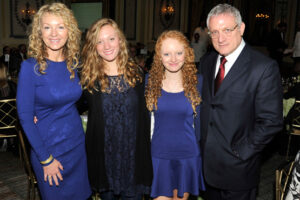
I guess what I’m saying is . . . even if you have found the love of your life, or even if you’ve decided to be a mother on your own, and whether your child will be biologically yours or adopted, I urge you to wait until you have experienced enough of the world to have grown into the most important role you will ever have — shepherding a human being from babyhood to adulthood. Psychologist Wendy Mogel wrote in her seminal parenting book, Blessings of a Skinned Knee, “Jewish wisdom holds that our children don’t belong to us. They are both a loan and a gift from God, and the gift has strings attached. Our job is to raise our children to leave us.” And that is what we should all hope to achieve, whenever we become parents.















